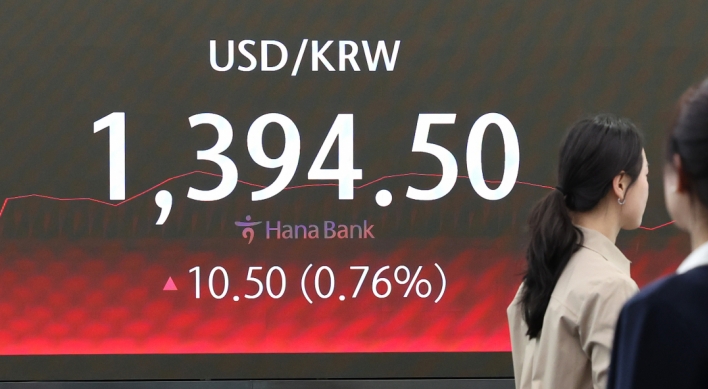South Korea's Gender Ministry blasted for denying LGBTI rights
By 이다영Published : Oct. 7, 2015 - 17:56
A group of South Korean LGBTI and human rights activists on Wednesday protested against the Gender Ministry’s recent order directing the Daejeon Metropolitan City to scrap articles that guarantee LGBTI rights in the city’s newly revised charter of gender equality, demanding an official apology and recognition of LGBTI rights as part of women’s rights.
The activists said they are bringing the particular issue to the U.N. Women, during a scheduled meeting with the organization’s policy director Dr. Purna Sen on Oct. 27 in New York.
The protesters, some 20 of them, included lawyers and activists for women with disabilities and victims of sexual violence. The participants, representing 12 NGOs, were initially scheduled to meet with Gender Ministry officials after holding a press conference, but the ministry canceled the meeting at the last minute on Tuesday night.
The activists said they are bringing the particular issue to the U.N. Women, during a scheduled meeting with the organization’s policy director Dr. Purna Sen on Oct. 27 in New York.
The protesters, some 20 of them, included lawyers and activists for women with disabilities and victims of sexual violence. The participants, representing 12 NGOs, were initially scheduled to meet with Gender Ministry officials after holding a press conference, but the ministry canceled the meeting at the last minute on Tuesday night.

The reason for the cancellation was, according to the ministry, that the officials thought the meeting was “going to be a private event” and the activists organized a press conference without consulting the public servants.
“This is both disrespectful and absurd,” said Na Young-jung, one of the protesters who participated in the rally.
South Korea’s Women’s Development Act, implemented in 1995 to protect women’s rights and combat discrimination against women, was renamed in July to expand the scope of protection against discrimination of both genders.
In June, Daejeon Metropolitan City revised its municipal charter of gender equality, based on the renamed Gender Equality Act, and newly introduced articles that protect the rights of the LGBTI community. The revised charter stipulated that the mayor of Daejeon is responsible for coming up with and implementing measures that guarantee equality of opportunity and diverse family life for LGBTI individuals.
However, after receiving complaints from gay rights opponents including religious group members, the Gender Ministry in August sent the municipal government of Daejeon an official order to delete the particular articles on LGBTI rights in its charter. The ministry claimed the revised Gender Equality Act in fact does not specifically include any articles on LGBTI rights, and therefore it is incorrect to state that the articles in the charter are based on the Act.
The Daejeon municipal government eventually scrapped the articles in the charter. “We had been planning to delete the articles even before the Gender Ministry sent us the request,” said Kwon Jun-sik from the Daejeon Metropolitan City. “We received a lot of complaints from citizens. We first assumed that the Gender Equality Act includes the concept of protecting LGBTI rights, but it turns out the Act does not specifically state that.”
The protesters demanded that the government must recognize and validate LGBTI issues as gender issues.
“Am I not a woman?” said Song Jeong-yoon, representing a group of sexual minority women at the rally. “This question was asked by black women about 160 years ago. They asked (while forced into slavery), ‘Are we not women?’ ‘Are we not human beings?’ I did not think I’d be asking this question in 2015. How can the Gender Ministry, a government body responsible for women’s rights, voluntarily exclude sexual minority women from benefiting from policies and measures for women?”
Bae Bok-ju, the head of a group of women with disabilities, also criticized the ministry for discriminating against LGBTI community.
“How is this (what the ministry has done) different from saying, ‘Women with disabilities shouldn’t be entitled to benefit from policies for women’?” she said at the rally.
Last month, a total of 12 United Nations entities, including UNHCR, U.N. Women and WHO, released a joint statement calling for an end to violence and discrimination against LGBTI people, asking governments to do more to tackle the issue.
“We remain seriously concerned that around the world, millions of LGBTI individuals, those perceived as LGBTI and their families face widespread human rights violations,” the statement said. “The statement is an expression of the commitment on the part of U.N. entities to support member states to (end violence against them).”
However, an official from the Gender Ministry, who did not wish to be named, said “the public has to be convinced first” in order to implement measures for LGBTI individuals in Korea. “We still don’t even have antidiscrimination laws,” she said.
She also claimed that the Human Rights Commission is in charge of LGBTI rights in Korea, not the Gender Ministry. “The LGBTI rights are protected under the National Human Rights Commission Act, not the Gender Equality Act,” she said.
According to a 2013 study conducted by the local think-tank Asan Institute for Policy Studies, only 21.5 percent of 1,500 surveyed Koreans said they had little or no objection to homosexuality.
Ryu Min-hee, an attorney at the Korean Lawyers for Public Interest and Human Rights, said the particular incident involving the Gender Ministry will be addressed at a meeting with U.N. Women’s Dr. Sen in New York later this month. At the meeting, the policy director is scheduled to meet with representatives of LBTI groups around the world.
“The U.N. entities have encouraged governments to do more to end discrimination against LGBTI community members. What the Gender Ministry is doing is the opposite of what’s been asked,” Ryu said. “We have our representative residing in New York and she will be discussing this matter at the meeting.”
By Claire Lee (dyc@heraldcorp.com)








![[KH Explains] How should Korea adjust its trade defenses against Chinese EVs?](http://res.heraldm.com/phpwas/restmb_idxmake.php?idx=644&simg=/content/image/2024/04/15/20240415050562_0.jpg&u=20240415144419)










![[Today’s K-pop] Stray Kids to return soon: report](http://res.heraldm.com/phpwas/restmb_idxmake.php?idx=642&simg=/content/image/2024/04/16/20240416050713_0.jpg&u=)